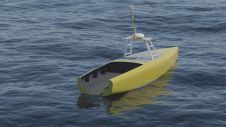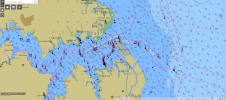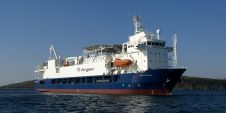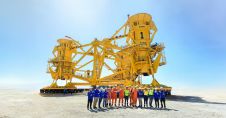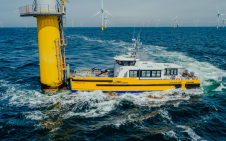The Independent Surveyor
Large companies dominate the survey industry and all these companies have their own procedures and methods. Some surveyors try to do it differently – they are independent and work for a broad spectrum of clients. This way, their ideas and working methods are spread over the hydrographic community. Tim Haycock is such an independent consultant in field construction and development, pipeline inspection surveys and offshore seismic exploration. Hydrointernationalasks Tim about his life as an independent surveyor.<P>
Can you briefly explain yourposition in the hydrographic world, your experience and present role?
I am a private consultancy, based in the UK but with a worldwide client base. I have been in our industry since 1980 when I joined Intersite Surveys bv in the Netherlands as a Hydrographic Surveyor. Since then, most of my work has been in the oil and gas sector and right now I am working on the Alvheim development, off Norway. I am also a technical author and part-time lecturer.
Why did you choose to be an independent consultant?
Mostly because it gives me the opportunity to see a project through from conception to delivery of the product. Secondly, being independent allows me to spend some time offshore, keeping up with the latest technical developments in our field, as well as working in my own office. By the time you get to my age, the industry has usually boxed you into one of two options: full-time in the office, or doing strict on–off rotations offshore.
As an independent consultant, you are also able to diversify into areas that an employed surveyor would find hard to retain as their own intellectual property. In the last few years, I have enjoyed having the opportunity to collaborate with the Skilltrade group in the Netherlands, resulting in my co-authorship of the Handbook of Offshore Surveying.
What can the role be of an independent project manager on a survey project?
Anything and everything! Firstly, you have no commercial ties with the personnel and equipment used for the project and, therefore, the client gets better value for money. Secondly, you bring your experience to the project and avoid the pitfalls of false economies or inadequate planning of the work to be done. Very often I have been asked to ‘rescue’ survey projectswhere the damage is already done, sometimes due to poor appreciation of the costs but usually technical ignorance, resulting in ‘cheap and cheerful’ surveys, which turn out to be inadequate for purpose. With proper management, our industry can do better than this.
In the present market, large survey companies are busy. Who are your main clients? Do you work directly for government institutions or do you mainly work for survey companies?
I have worked as an independent surveyor for survey and construction companies, but predominantly I work for the oil and gas operators who have little or no survey experience in-house. My dealings with government institutions are limited, probably to our mutual benefit.
As a teacher and independent consultant, you can share your ideas and innovations with many people. Can you elaborate on this?
Yes. When lecturing, it is usual to find that no matter how carefully you try to ‘group’ delegates or students on a course, there will inevitably be an unbalanced experience base, which in theory slows down the teaching process. However, this need not be the case and it often leads to a more challenging and enjoyable course. This is why I think the way forward in educating our industry is to broaden the skills base, making the individual surveyor a more professional member of any organisation. I appreciate that ‘a little knowledge is dangerous’, but a wider understanding of the specialist disciplines of our industry has to be a positive thing.
I will give you an example: tonight I will be joining a survey ROV vessel that is tasked with running a few lines of towed magnetometer as well as a sizeable ROV inspection programme. It transpires that only the marine crew and one survey crew member (a geophysicist) have any practical experience in towed-sensor acquisition. This does not detract from the highly professional skills of this particular crew. It simply illustrates how ‘polarised’ parts of our industry have become.
Do you have a special concept, innovative working method or idea as a ‘unique selling point’?
No. Just lots of experience, learned from making plenty of mistakes.
Is the community of independent consultants organised? If so, how?
Well, this has to include every self-employed member of the survey industry, totalling thousands worldwide, and the short answer is no. Independent consultants may apply for membership of the Royal Institution of Chartered Surveyors (RICS), the Hydrographic Society or the International Marine Contractors Association (IMCA), but none of these organisations are geared exclusively to their needs. It is your peer-group that will probably provide the best guidance and support.
As a consultant on a large range of projects, you work with many people. With the present-day shortage of young people in the survey industry, do you foresee possibilities of reducing the human factor by innovation?
In the last 10 years, there has been considerable investment in the development of faster and therefore less time- and cost-consuming data-acquisition tools. I am thinking of swath bathymetry, digital sonar and AUVs, in particular.
However, these systems have to be operated by skilled people. I have often listened to the argument (usually from accountants) for making systems so idiot-proof that almost anyone can be employed to ‘push the green button on the black box’, but I think this is a false economy. Firstly, the personnel ‘pushing the buttons’ have to be suitably trained and have sufficient experience to usefully interpret the data acquired. Secondly, only trained and experienced personnel can evaluate the likely errors and accuracies of the acquisition package, thereby qualifying the results for the end-user or client.?
What is your message to those who want to start as an independent consultant or surveyor?
Well, there is no way of jumping the experience ladder, so after a suitable period of employment and with a varied and full CV, you can do so whenever you feel there is a place for you. Usually, this involves starting off by working as a self-employed member of a consultancy firm, which is what I did. The risk is that the work you relied on dries up and you are back on the beach looking for another project at the wrong end of the season – or that there is an unexpected down-turn in the industry (unlikely in 2008 I suspect).
Alternatively, if you just want to move on because you are stuck doing the same type of operation on every offshore trip – ask your employers to cross-train you instead. After all, they may have read this interview!

Value staying current with hydrography?
Stay on the map with our expertly curated newsletters.
We provide educational insights, industry updates, and inspiring stories from the world of hydrography to help you learn, grow, and navigate your field with confidence. Don't miss out - subscribe today and ensure you're always informed, educated, and inspired by the latest in hydrographic technology and research.
Choose your newsletter(s)













